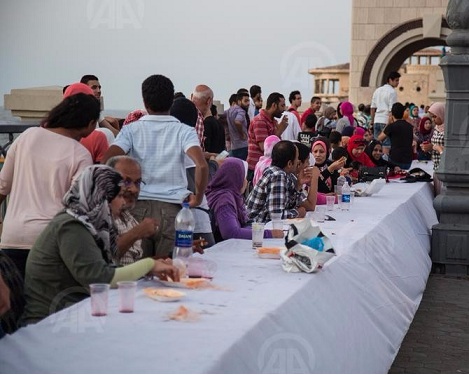
My family went to the Middle East, Egypt to be precise, for the end of Ramadan. It was a time for everyone to see my increasingly frail parents.
The kids got quality time with Giddu & Teita. They also saw what a real Ramadan in the Middle East looks like. They saw how different it is to the sad show in many American mosques.
People Fed Up With Islamists In The Middle East
After a few years hiatus, something new was in the air. I noticed how easy it has become for people in the Middle East to talk about Islamists. People are fed up with them. Two factors matter most: ISIS’ brutality, and a backlash against the Muslim Brotherhood’s disastrous time ruling Egypt. Both created a palpable rejection of Islamists and political Islam. Attitudes on Sissi’s brutal crackdown on the Brotherhood are a separate sad topic.
Devout Socially Conservatives Hate Islamists
I chatted with many devout and socially conservative folks who genuinely hate the Islamists. Many of them once gave the Brotherhood the benefit of the doubt as men of God. What seems to have changed, even before the Sissi coup, is that people came to see the Brotherhood as a kind of cult, loyal not to God but to their Murshid (guide). People were turned off by how the Brothers’ only real loyalty was to their movement, not to the country or to Islam.
Complex Reality
After all, in 2014, millions of Egyptians marched in the streets against the Brotherhood chanting: “Down, down with the Murshid’s rule!” Today, several years later, people are very happy the Brotherhood no longer controls Egypt and will say so bluntly (without necessarily loving the new status quo). One person told me: “The Brothers are frauds who abused our love of Islam! They presented themselves as men of God, but when they took power they behaved like a clan.”
Undisguised Hostility to The Muslim Brotherhood
I was surprised at how people didn’t hide their anger with the Ikhwan, which has seen its grassroots support erode. Then I flew back to the US – where the contrast can’t be any starker. Most Muslims in America are afraid to call out the Brotherhood, which has a massive presence in our communities. Why do we struggle to speak bluntly the way folks back in Egypt do? What changes in us when we board a plane in Cairo and land in New York? Over there we march by the millions against the Brotherhood and drove them into the shadows. Here, we say nothing about the Ikhwan-dominated mosques down the street.
I’m struggling to make sense of this contrast. Here are some theories:
Our “Under-Siege” Mentality: We have a lack of self-confidence. In Egypt, everyone is secure in one’s Muslim identity, surrounded by millions of fellow Muslims with no feeling of putting oneself at risk. By contrast, American Muslims increasingly sense our identity is not secure.
Muslim Institutions with Real Credibility:In Egypt, Tunisia or Morocco, there are thousand-year-old Muslim institutions like Al Azhar, Zeitouna and Al Karawyin that are not controlled by a cult. These institutions have flaws. But they also have real legitimacy. Conversely, here in the US, the few institutions we have are relatively new (most less than 40 years old) and most were established by the Brotherhood. These groups derive their legitimacy by presenting themselves as the defenders of Muslims in America and the educators of our American-born children.
Grateful to Have a Local Mosque
Anti-Muslim bigots like to say that all Muslims are in on a grand conspiracy to dupe the American public and impose Sharia in America. They don’t realize the degree of obliviousness in our communities. The average Muslim doesn’t realize the game that’s being played on them by the Brotherhood here in America. When you move to a new city, you’re just grateful there’s a mosque there (unlike in Egypt, where you have many mosques everywhere). Beggars can’t be choosers when you need to go for joumaa or Eid prayers. For many of us, our contact with the Islamist networks who control most of our institutions is limited to the occasional times you show up for prayers. When you’re busy running your life, keeping tabs on the Islamists’ shenanigans is not a top priority.
No One Wants To Be “The Traitor
In the Middle East, there are a million mosques. you don’t even need to go to one to be part of a “Muslim community.” In many American towns the community is small and there are few alternatives. Then, you have the constant – albeit wrong – feeling that criticizing Islamists serves anti-Muslim bigots. If you speak out here, it can mean risking your ties to the only organized Muslim community available to you. In the Middle East, we also enjoy deep roots via family and clan. In America, if you are in a small city, your options are so limited. All it takes to make you think twice is someone whispering: “Brother, don’t talk about the problems or embarrass us. if you do the government will shut down the mosque. And it’ll be your fault”
Unhealthy Self-Censoring
Deep down, many of us do know that there is something wrong. Instead of speaking, we avert our gaze. We hear something inappropriate and we ignore it. We have an impulse to speak out yet we suppress it instead to stay silent. There is self censorship embedded inside us. And it’s not a healthy thing for us on a community or a personal level.
Healthier Discussion In The Middle East Than America
Ironically, in the Middle East’s chaos, they are having a much healthier discussion than us in a liberal democracy!
In a war-torn Syrian town (Maarat Numan) the people rose to kick Al Qaeda out of the local mosque. Contrast that with our own fear here in America of upsetting US Islamists. These are simple citizens who have no government, no FBI, no military. They are just decent people refusing to take shit from Islamists.
Speaking bluntly about Islamists is a Middle East trend that (for a change) we Americans would do ourselves a favor importing. . Maybe it would be therapeutic for us to go overseas to practice speaking out to see how healthy it can be.
